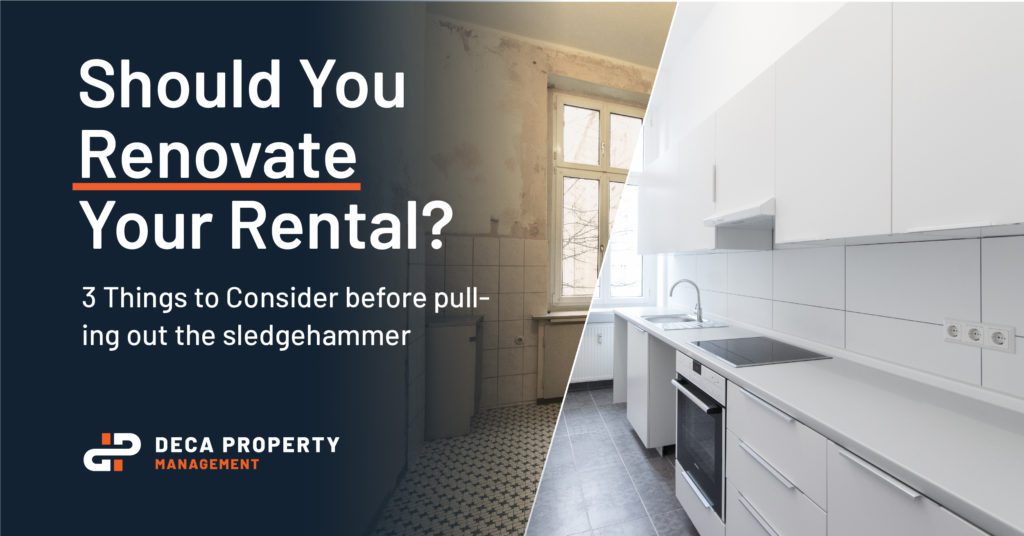
Let’s face it, the housing market is hot! With that kind of competition, many people that were considering home ownership have decided to continue renting until the market cools off a bit. With more tenants in the mix, many landlords are considering renovating their units to gain higher rents. But the question remains, will your rental property renovation bring in the return you’re hoping for?
There are 4 key questions to ask yourself, besides “Will I get a higher rent?”, when planning a renovation. These questions are:
- Will this renovation reduce maintenance and operating costs?
- Will this renovation attract higher-quality tenants
- Will this renovation increase the property value?
- Will this renovation help me stay competitive in the rental market?
In the article “Determining Renovation Costs For Your Rental Property” author Hayley Grgurich outlines three considerations as you budget for renovations on your rental property. Do not renovate your rental property the way you would renovate your own home, and don’t forget about return on investment.
Consideration 1: What to Repair vs. What to Replace in Your Rental Property?
If you are deciding whether to repair or replace, note that there is a tax incentive for landlords to conduct repairs in their rental properties rather than replacements or renovations. This is because repairs are immediately deductible as an expense, whereas renovations must be amortized over a handful of years.
Consideration 2: Choosing Rental Property Renovations with the Greatest ROI
There are a handful of reasons you would want to renovate your rental but getting some return on your investment is usually one of them. That’s why it’s essential to determine which parts of your rental property will bring in the most return on investment from a renovation.
Prospective homebuyers often cite the kitchen as the most important room in the home, followed by the master bedroom and living room. Among renovation projects, the following were the most affordable AND had the best ROI, according to the website Remodeling:
- Midrange bathroom remodel: Cost $20,420 with a ROI of 67%. Note that bigger doesn’t always mean better ROI. An “upscale” bathroom remodel cost more than 3 times the midrange upgrade, but only recouped 60% of its costs.
- Minor kitchen remodel: Cost $11,507 with a ROI of 81%.
- Bathroom accessibility updates: Such renovations are particularly good for markets with older renters interested in aging in place. The average cost of this work in 2019 was $33,374, but owners recouped 63% of the cost on resale.
Consideration 3: Keep Rental Property Renovations Simple
Even modest bathroom and kitchen renovations can have a big impact on your rental prospects and returns. Here are some basic kitchen and bathroom renovation strategies to try according to the needs of your space and your available budget:
Finally, it’s important to avoid over-renovating your rental. Keep in mind the size and style of the rental property, the neighborhood your property is located in, and what your rental competition is in the area. You don’t want to go overboard on renovations only to find out that factors like these will limit the actual return on your investment.
Renovations can feel like a big undertaking, but even on a budget, you can do a lot to raise the appeal for future tenants and add value to your property. At the end of the day, well-planned renovations can help you increase your rent, reduce maintenance costs, and better position you to compete with other rentals in the area so you can secure quality tenants.
A Deca Case Study
Kevin Y purchased a duplex in the St. Louis Hills area in 2020. He hired Deca Property Management to manage the building. His rents were $800 per unit, and he paid $157,500 per unit.
His property management team at Deca discussed with him the need to renovate the units for a multitude of reasons:
- Rents could be increased by 50%.
- The value of his building could increase by 25%.
- The improvements were needed for his building to compete in the neighborhood.
The Deca maintenance team recommended the following improvements:
- Kitchen upgrade – new cabinets and flooring
- Bathroom upgrade – increase lighting, new toilet, new tub, and new vanity
- Refinish the hardwood floors
- Paint the entire unit
The entire project cost $20,000. Kevin decided to move forward with the renovations, and these were the results:
- Rents increased from $800 per month to $1200 per month.
- Value of property increased from $315,000 to $395,000.
Was it worth spending $20,000 to increase rents by $400 per month? The cost of the borrowed funds was $359 per month which was covered by the rental increase of $400. The hidden benefit of the renovation included:
- Rents increased $400 per month with a ROI of 24% (2.46% ROI until renovation loan is paid)
- Operating expenses decreased
- The unit rented in days
- The resident is more than likely to renew their lease due to the upgraded condition
- The value of the property increased by $80,000 and the ROI was 400%.
In this case the math worked, and Kevin was very happy with the results.

